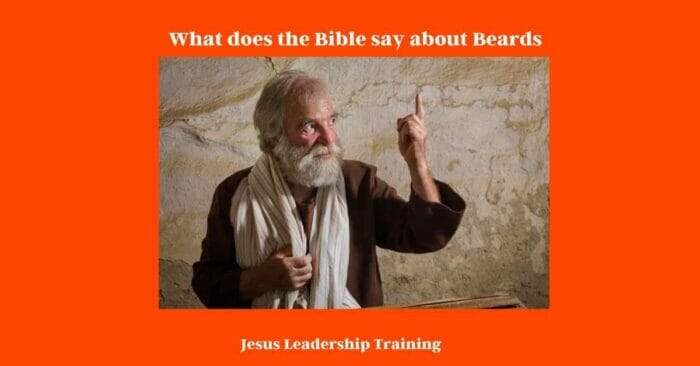What does the Bible say about Beards – Beards are mentioned 19 Times in Bible. There is a lot of debate surrounding beards these days. Some people think they are the epitome of manliness, while others believe that they make a man look untidy and unprofessional. So what does the Bible have to say about beards? Let’s take a closer look at what Scripture has to say about this topic.
Table of Contents
Bible Verses in the King James Bible
- Lev 13:29,30
- Lev 14:9
- Lev 19:27
- Lev 21: 5
- 1 Sam 17:35
- 1 Sam 21:13
- 2 Sam 10:4,5,
- 2 Sam 20:9
- 1 Chron 19:5
- Ezra 9:3
- Psalms 133:2
- Isa 7:20
- Isa 15:2
- Jer 41:5
- Jer 48:37
- Ezk 5:1
- 2 Sam 19:24
- 1 Corinthians 11:6
What does the Bible say about Beards?
What does the Bible say about Beards – For many Christian men, the question of whether or not to grow a beard is a difficult one. On the one hand, there are plenty of verses that seem to indicate that beards are honorable and even required for manliness. On the other hand, there are also verses that suggest that beards are unnecessary and even unattractive. So, what’s a guy to do? In this post, we’ll take a look at what the Bible has to say about beards in an effort to arrive at a conclusion.

On the surface, it would appear that the Bible is decidedly pro-beard. Leviticus 19:27, for example, God tells his people not to shave the edges of their beards. And in 2 Samuel 10:4-5, when David’s men were mocked by the Philistines for being too effeminate to grow beards, they took it as a great insult.

But things get a bit more complicated when we consider some of Jesus’ teachings on the matter. In Matthew 5:36, Jesus says, “And don’t swear by your head, for you can’t make even one hair white or black.” Some have interpreted this verse to mean that hair and beards are unimportant and not worth our attention. Additionally, in 1 Corinthians 11:14-15, Paul writes that it is disgraceful for a man to have long hair. Nowhere does he mention beards specifically, but some have extrapolated from this verse that beards are also disgraceful.
Similarly, in 1 Corinthians 11:14, Paul says that it is “a disgrace for a man to have long hair,” which probably means that men who did not follow the conventions of their culture were considered shameful. Since shaving was the norm in biblical times, Paul’s statement indicates that men who did not shave their beards were going against cultural norms.
table highlighting some instances in the Bible where beards are mentioned, along with the accompanying biblical references.
| Biblical Figure | Reference | Beard Significance |
|---|---|---|
| Aaron | Psalm 133:2 | The anointing oil running down Aaron’s beard symbolizes the unity and blessing of God. |
| David | 1 Samuel 21:13 | David disguised himself by letting his beard grow unkempt and feigning madness. |
| Ezra | Ezra 9:3 | Ezra pulled his beard out in grief and horror when he learned that people of Israel had been unfaithful. |
| Job | Job 1:20 | Job shaved his beard as a sign of mourning after losing his children and wealth. |
| Mephibosheth | 2 Samuel 19:24 | Mephibosheth did not trim his beard or his nails as a sign of mourning while David was gone. |
| Levite Priests | Leviticus 19:27 | The Levitical law prohibited the priests from shaving off the corners of their beards, signifying their separation for God’s service. |
| Jesus Christ | Isaiah 50:6 | The prophetic description of the Suffering Servant (interpreted by Christians as Jesus) includes the plucking of the beard, indicating the abuse he would undergo. |
This table captures some of the notable instances where beards were part of the narrative, symbolizing different things ranging from grief to piety. These instances showcase how integral the beard was to the identity and experiences of biblical figures.
Beards are mentioned often in the Bible and have many different connotations. From Moses to Jesus, Isaiah to Paul, beards were ties that bound these men together as Biblical figures. In this bibliographic study, we will take a look at the different ways in which beards are mentioned in the Bible, and what those mentions might mean.
Jesus and Beards
In John 14:30, Jesus says “I will not speak much more with you, for the prince of this world is coming. He has no power over me,” just before Judas betrays him. Here, Jesus refers to Satan as the “prince of this world.” Satan is often portrayed as having a beard in artwork, but there is no mention of his facial hair in the Bible. It is possible that artists began adding beards to Satan’s image because they wanted to show him as being similar to other powerful biblical figures such as Moses or Paul.
Paul and Beards
Paul was an important figure in both the Old and New Testaments. In Acts 18:18, we read that “Paul remained there for some time longer, then took leave of the brothers and set sail for Syria.” While it’s not specifically stated, it’s likely that Paul had a beard at this point in his life. In 1 Corinthians 11:14-15, Paul writes “Does not nature itself teach you that if a man wears long hair it is degrading to him, but if a woman has long hair it is her glory? For her hair is given to her for a covering.” Here, Paul is saying that women should wear their hair long as a sign of their femininity, while men should keep their hair short so as not to appear feminine. This verse implies that beards are masculine, and that they should therefore be kept short.

We have also seen that while art may depict Satan as having a beard, there is no mention of his facial hair in the Bible itself. Finally, we have seen that Paul believes beards are masculine and should therefore be kept short. Whether you see them as positive or negative symbols, there is no denying that beards play an important role in the Bible.
Hebrew beard meaning
- Zaqan – The Beard
- Spham – The Chin or Upper Lip
Should a Christian have a beard
Christians are often divided on the issue of whether or not men should wear beards. Some argue that it is a matter of personal preference, while others believe that it is a sign of maturity and wisdom. There is no clear answer in the Bible, but there are some principles that can help us make a decision.
First, we should remember that our bodies are temples of the Holy Spirit (1 Corinthians 6:19). This means that we should take care of our bodies and present them in a way that honors God.
Second, we should consider how our choices will affect others. If our appearance will cause another person to stumble, then we should avoid it (1 Corinthians 8:9).
Third, we should be mindful of cultural norms and traditions. In some cultures, beards are seen as a sign of respect and authority, while in others they are considered to be unclean. We should be sensitive to the way our choices will be received by those around us.
Ultimately, the decision of whether or not to wear a beard is a personal one. We should Prayerfully consider what would be most honoring to God and helpful to others, and then make a Choice based on that.
Is it a sin to have a beard?
There is much debate on whether or not it is a sin to have a beard. Some people argue that the Bible doesn’t explicitly say anything about beards, so we can’t know for sure. Others point to 1 Corinthians 11:14, which says that it is a disgrace for a man to have long hair.
While this verse does seem to indicate that it is wrong for a man to have long hair, it doesn’t say anything about beards. So the answer to the question of whether or not it is a sin to have a beard is still not clear. However, there are some who believe that beards are a sign of spiritual maturity and wisdom.
Bible Shaving Tools
Bible about the tools used for beard trimming or shaving. Here are some of the utensils that are specifically mentioned or implied:
- Razors: Razors are the most commonly mentioned tool for shaving in the Bible. The prophet Ezekiel, for instance, was commanded by God to shave his head and beard with a razor as a sign of the coming judgment on Jerusalem (Ezekiel 5:1).
- Sharp Stones/Flints: Before the invention of metal blades, it is likely that sharp stones, possibly flints, were used for shaving. In fact, God tells the prophet Ezekiel to use a sharp sword as a barber’s razor, which implies that sharp stones could have been used for this purpose (Ezekiel 5:1).
- Shears: While not directly mentioned in the context of shaving or trimming beards, shears were commonly used in ancient times for cutting hair and could likely have been used for beard trimming as well.
It’s important to note that grooming practices like shaving were often tied to religious and cultural norms. In many ancient cultures, including among the Israelites, a man’s beard was considered a sign of his dignity and maturity. Laws in Leviticus (19:27 and 21:5) even prohibited the Israelites from shaving off the corners of their beards, a practice associated with pagan rites.
In the Bible, many of the great men of God, such as Moses and Aaron, are described as having beards. So perhaps there is something to be said for the argument that beards are a sign of spiritual maturity. At the end of the day, though, whether or not you choose to grow a beard is up to you. What matters most is your heart attitude and relationship with God.

Examples of Men Who Had Beards in the Bible (King James Bible)
- Aaron
- Amasa
- Lepers
- Goliath
- King David
- Davids Servants
- Mephibosheth
Types of Beards in the Old Testament (King James Version) (World English Bible)
- Shaved Beard
- Full Beard
- Trimmed Beard
- Round
- Pointed
- Full Round
- Cut as a sign of Grief
- Beards customarily equal with Wisdom
- Beard Mutilation is a sign of Great Distress
- Egyptian Beards
- Assyrian Beards
- Babylonian Beards
- Wester Semites
Is it a Sin to Shave your Beard Islam
In the Old Testament, God gave a very clear command to the Israelites regarding beards. In Leviticus 19:27, God says, “Do not cut the hair at the sides of your head or clip off the edges of your beard.”
This command was given in the context of worship and was meant to help the Israelites distinguish themselves from the pagan nations around them. In other words, it was a way of saying, “You are different from them because you belong to Me.”

While there is no explicit command in the New Testament regarding beards, there are a few principles that can be gleaned from Scripture. First, we see that God values inner character over outward appearance. In 1 Samuel 16:7, God says, “The Lord does not look at the things man looks at. Man looks at the outward appearance, but the Lord looks at the heart.”
This is reiterated in Matthew 23:25-26, where Jesus warns against letting our outward appearance take away from our inner goodness. Second, we see that following God’s commands should always take precedence over cultural norms or personal preferences. In Acts 21:17-24, we see that even though Paul had taken a vow to shave his head in accordance with Jewish custom, he was willing to forsake that vow and put obedience to God first.
So what does this mean for us today? While there is no explicit command from God regarding beards, we see that He cares more about our inner character than our outward appearance.
We also see that following His commands should always take precedence over cultural norms or personal preferences. As believers, we should seek to honor God in all areas of our lives, including our decision of whether or not to shave our beards.
What Ancient Civilization wore Beards according to Archaeology
Archaeologists have found that many ancient civilizations wore beards. The Sumerians, who lived in Mesopotamia, were some of the earliest known people to sport facial hair. In fact, most of the male figures depicted in Sumerian art are bearded.
The ancient Egyptians also favored beards, and they even had special combs and oils for grooming their facial hair. The Egyptians believed that beards were a sign of wisdom and dignity, and they often associated them with the gods.
In contrast, the ancient Greeks generally considered beards to be somewhat uncivilized. Nevertheless, many famous Greek philosophers and thinkers such as Socrates and Aristotle sported full beards. The Romans also tended to view beards with suspicion, although they did grow them on occasion for religious or political reasons. In the end, there is no one answer to the question of why ancient civilizations wore beards. It seems that each culture had its own reasons for embracing facial hair.
Religious Faiths today that encourage the Wearing of Beards
Religious faiths that encourage the wearing of beards are numerous. In the Old Testament, Moses commanded the Israelites to wear beards (Leviticus 19:27). The prophet Samuel also had a beard (1 Samuel 16:13). Throughout the Bible, beards are seen as a sign of manhood, wisdom, and authority. Today, there are still many religious faiths that view beards in a positive light.
For example, Sikhism is a religion that originated in India in the 15th century. One of the tenets of Sikhism is that men must wear their hair unshorn – including their facial hair.
Many Orthodox Jews also believe that it is disrespectful to God to shave one’s beard.
Certainly, here is a table outlining various religions that encourage or have specific guidelines about beards.
| Religion | Beard Significance |
|---|---|
| Islam | Many Muslims believe that keeping a beard is a fundamental part of their faith. Prophet Mohammed is often depicted with a beard, and hadiths (sayings of the Prophet) instruct followers to grow beards. |
| Sikhism | Sikhs consider hair as a gift from God and a symbol of spirituality. Kesh, or uncut hair, is one of the five articles of faith in Sikhism, making the beard a significant aspect of a Sikh man’s identity. |
| Eastern Orthodox Christianity | It is common for monks and priests in this faith to grow beards, seen as a symbol of wisdom and maturity. It’s also a nod to Jesus Christ, often depicted with a beard. |
| Judaism | Some Jewish men, especially those of Orthodox faith, refrain from shaving their beards as a fulfillment of Leviticus 19:27, which forbids shaving the “corners of the head” and “marring the corners of the beard.” |
| Amish & Mennonites | In these Christian denominations, men typically grow beards after they marry as a symbol of adulthood and respect. |
| Rastafarianism | The beard is considered a symbol of the Lion of Judah and an emblem of strength. It’s also tied to the Nazirite vow, which includes never shaving or combing the hair. |
Remember that practices can vary significantly within each religious group, so not every individual’s practice will align perfectly with these general observations. Always approach this topic with respect and curiosity, acknowledging the rich diversity within and among religious traditions.
In Muslim cultures, beards are often seen as a sign of piety and manliness. While not all religious faiths encourage the wearing of beards, it is clear that there is a long tradition of doing so within many different spiritual traditions.
Types of Beards worn today
In the Bible, beards are mentioned often and even held in high esteem. In fact, there are many different types of beards described in the Old Testament. Here is a list of the different types of beards found in the Bible.
1. The Full Beard
The full beard is probably the most common type of beard found in the Bible. It is a beard that covers the entire face and is often seen as a symbol of manliness. One of the most famous examples of a full beard can be found on Aaron, the brother of Moses.
2. The Goatee
The goatee is a small beard that only covers the chin and lower lip area. It is often seen as a more sophisticated type of beard. An example of someone who sported a goatee was Joseph, the father of Jesus.
3. The Van Dyke
The Van Dyke is similar to the goatee but also includes mustaches that are long and pointy. It was popularized by the Flemish painter Anthony van Dyck who lived in the 17th century. An example of someone who wore a Van Dyke was Absalom, one of King David’s sons.
4. The Stubble Beard
The stubble beard is a short, bristly beard that only covers the lower part of the face. It is often seen as a more rugged type of beard. An example of someone who sported a stubble beard was Esau, the brother of Jacob.
5. The Spade Beard
The spade beard is a type of goatee that is shaped like a spade or triangle. It was popularized by Robert Downey Jr. in the Iron Man movies. An example of someone who wore a spade beard was Samson, one of the Judges of Israel.
What Does The Bible Say About Beards: A Deep Dive Into Facial Hair In Biblical Times
This comprehensive guide explores what the Bible says about beards, their spiritual significance, symbolism, and the importance of beards in biblical times. Discover if it’s a sin to have a beard, what a Hebrew beard means, and whether pastors should have beards.
Is It a Sin to Have a Beard?
Throughout the Bible, there are various interpretations about the act of wearing a beard, making it a complex topic to delve into. To answer the question “Is it a sin to have a beard?”, it’s necessary to explore the Hebrew beard meaning, the stance of pastors having beards, and references of beards in the New Testament.
Hebrew Beard Meaning
The Old Testament of the Bible, written primarily in ancient Hebrew, offers several references to beards. In Leviticus 19:27, it’s written, “You shall not round off the hair on your temples or mar the edges of your beard.” Here, the act of shaving or cutting the beard was seen as a form of self-mutilation associated with pagan rituals, making it unacceptable. Thus, beards were highly revered and protected.
Should Pastors Have Beards?
The Bible does not explicitly comment on whether pastors or religious leaders should have beards. Nonetheless, the cultural context in which these texts were written suggests that beards were a sign of manhood, wisdom, and dignity, traits commonly associated with religious leadership. The decision for a pastor to have a beard today may rest more on personal and cultural preferences than on biblical mandates.
Beards in the Bible New Testament
The New Testament offers few references to beards. Yet, it’s notable that the most influential figure of the New Testament, Jesus Christ, is often depicted with a beard, following the cultural customs of Jewish men of His time.
What Does a Beard Symbolize in the Bible?
In the Bible, a beard symbolizes several spiritual and societal factors. It can represent spiritual dedication, social standing, wisdom, and virility. Each of these facets contributes to the holistic understanding of beards in biblical times.
Spiritual Significance of Beards
In biblical times, beards were considered a physical manifestation of spiritual maturity. Leviticus 21:5 states, “They shall not make baldness upon their head, neither shall they shave off the corner of their beard,” which religious leaders strictly followed.
Aaron’s Beard Symbolism
Psalm 133:2 likens brotherly unity to the anointing oil running down from Aaron’s head to his beard, emphasizing the priestly, sanctified status associated with a well-groomed beard.
Social Standing
A full, uncut beard was a symbol of social standing in biblical times. A man’s beard was a source of pride and honor. Shaving it or cutting it short was often a sign of mourning, disgrace, or slavery.
Wisdom
Beards were synonymous with wisdom and experience, as they typically took many years to grow fully. Many of the wise men and prophets depicted in the Bible, such as Moses and Aaron, are described as having long beards.
Virility
The Bible associates beards with masculinity and virility. A beard was a clear sign of puberty, marking the transition from boyhood to manhood.
Why Were Beards so Important in Biblical Times?
Given the various connotations of beards during biblical times, it’s clear that they were of significant importance. They not only defined a man’s appearance but also represented his social, spiritual, and personal identity.
Christian Religions That Require Beards
While the Bible doesn’t explicitly require Christians to grow beards, some Christian sects view the beard as a symbol of piety. For instance, in Eastern Orthodox and most Oriental Orthodox Churches, clergy are required to grow beards.
FAQs about Beards
Why is there so much emphasis on beards in the Bible?
The emphasis on beards in the Bible reflects the cultural and societal norms of the time. Beards were seen as a sign of masculinity, wisdom, and maturity, so they carried significant weight in society.
Are Christian men required to grow beards?
The requirement for Christian men to grow beards varies across different sects and denominations. Some encourage it as a sign of piety, while others leave it to personal preference.
What does the Bible say about shaving beards?
In Leviticus 19:27, it discourages men from shaving or cutting their beards, as it was seen as a form of self-mutilation tied to pagan rituals. However, this was a specific commandment for the Israelites and not a universal mandate.
Does having a beard make one more spiritual according to the Bible?
The Bible does not directly link spirituality to having a beard. While it symbolizes spiritual maturity, it does not determine one’s spiritual growth or connection with God.
Why is Aaron’s beard mentioned in the Bible?
Aaron’s beard is mentioned in Psalm 133:2 as a metaphor for unity and the pleasantness of brethren dwelling together. The oil running down Aaron’s beard symbolizes divine blessing and sanctification.
Are there any specific rules for grooming beards in the Bible?
There are no specific grooming rules in the Bible. The primary mandate was not to cut or shave the beard as it was seen as a form of self-mutilation.
What Does the Bible say about Beards KJV
Table: What the Bible (KJV) Says About Beards
| Verse Reference | Verse Description |
|---|---|
| Leviticus 19:27 | “Ye shall not round the corners of your heads, neither shalt thou mar the corners of thy beard.” This commandment to the Israelites indicates certain cultural or religious practices related to trimming the beard. |
| Leviticus 21:5 | “They shall not make baldness upon their head, neither shall they shave off the corner of their beard, nor make any cuttings in their flesh.” Again, specific instructions for priests about their appearance. |
| 2 Samuel 10:4-5 | “Wherefore Hanun took David’s servants, and shaved off the one half of their beards… When they told it unto David, he sent to meet them, because the men were greatly ashamed…” This incident, where David’s men had half of their beards cut off, was taken as a significant insult and disgrace. |
| Ezra 9:3 | “And when I heard this thing, I rent my garment and my mantle, and plucked off the hair of my head and of my beard, and sat down astonied.” Ezra’s distress is manifested in tearing out his hair and beard. |
| Isaiah 50:6 | “I gave my back to the smiters, and my cheeks to them that plucked off the hair: I hid not my face from shame and spitting.” This prophetic passage speaks of the suffering servant, which Christians understand as referring to Christ. The act of plucking the beard is used to depict humiliation. |
While the Bible does reference beards on a few occasions, it’s mostly within a cultural or specific situational context. The beard was seen as a sign of manhood and honor in many ancient cultures, including the Hebrew culture.
Bible Verses About Beards 🧔
In the Bible, beards hold a symbolic and cultural significance, often representing masculinity, wisdom, and authority. Several verses throughout the Scriptures mention beards, shedding light on their importance in ancient times. One such verse is found in Leviticus 19:27, where it is written, “You shall not round off the hair on your temples or mar the edges of your beard.” This commandment illustrates the value placed on preserving the natural growth of one’s beard in Old Testament law.
1st Takeaway: Cultural Significance 🌍
Beards played a vital role in the cultural norms of biblical times. They were a symbol of honor and dignity, and this is reflected in Leviticus 19:27. The prohibition against rounding off the hair on the temples or marring the edges of the beard was a way of maintaining a distinction between the Israelites and the surrounding cultures. It emphasized the importance of preserving one’s identity and adhering to God’s commands.
2nd Takeaway: Beard as a Symbol of Authority and Wisdom 📜
Throughout the Bible, beards are often associated with authority and wisdom. For instance, in the story of Samuel anointing David as king (1 Samuel 16:12), we read, “He was ruddy, with a fine appearance and handsome features. Then the Lord said, ‘Rise and anoint him; he is the one.'” This passage implies that David’s appearance, including his beard, was a part of his regal and wise demeanor, qualities that were valued in a leader.
3rd Takeaway: New Testament Perspective 📖
While the Old Testament provides insights into the cultural significance of beards, the New Testament offers a different perspective. In 1 Corinthians 11:14, it is stated, “Does not nature itself teach you that if a man wears long hair it is a disgrace for him?” This verse hints at the changing cultural norms in the early Christian community, where the focus shifted away from outward appearances, including beards, towards matters of the heart and faith.
In conclusion, the Bible contains verses that emphasize the cultural significance of beards in the Old Testament, highlighting their role as symbols of identity, authority, and wisdom. However, as Christianity evolved, the New Testament introduces a different perspective, emphasizing the importance of inner character over outward appearances. These verses provide valuable insights into the historical and cultural contexts surrounding beards in biblical times, offering lessons about the importance of cultural norms, identity, and spiritual priorities.
8 Bible Verses about Beards
Beards have held cultural and symbolic significance throughout history, including in the Bible. Here is a list of Bible verses that mention or reference beards:
- Leviticus 19:27 – “You shall not round off the hair on your temples or mar the edges of your beard.” This verse emphasizes the preservation of one’s beard as a cultural and religious practice among the Israelites.
- 2 Samuel 10:4-5 – “So Hanun took David’s servants and shaved off half the beard of each and cut off their garments in the middle, at their hips, and sent them away. When it was told David, he sent to meet them, for the men were greatly ashamed. And the king said, ‘Remain at Jericho until your beards have grown and then return.'”
- Psalm 133:2 – “It is like the precious oil on the head, running down on the beard, on the beard of Aaron, running down on the collar of his robes.” This verse symbolizes the unity and blessings of God’s people using the imagery of oil running down Aaron’s beard.
- Ezekiel 5:1 – “And you, O son of man, take a sharp sword. Use it as a barber’s razor and pass it over your head and your beard. Then take balances for weighing and divide the hair.”
- Ezekiel 44:20 – “They shall not shave their heads or let their locks grow long; they shall surely trim the hair of their heads.”
- Amos 9:1 – “I saw the Lord standing beside the altar, and he said: ‘Strike the capitals until the thresholds shake, and shatter them on the heads of all the people; and those who are left of them I will kill with the sword; not one of them shall flee away; not one of them shall escape.'”
- 1 Samuel 21:13 – “So he changed his behavior before them and pretended to be insane in their hands and made marks on the doors of the gate and let his spittle run down his beard.”
- Daniel 10:3 – “I ate no delicacies, no meat or wine entered my mouth, nor did I anoint myself at all, for the full three weeks.”
These verses provide various insights into the cultural, religious, and symbolic aspects of beards in biblical times. They reflect the significance of beards in the context of identity, customs, and rituals during different periods in history.
Final Thoughts – What Does the Bible Say about Beards
As you can see, there are many different types of beards found in the Bible! Each type has its own symbolism and meaning. What type of beard do you think would best suit you? With or without we can please God by having a clean heart.
God Bless Greg




